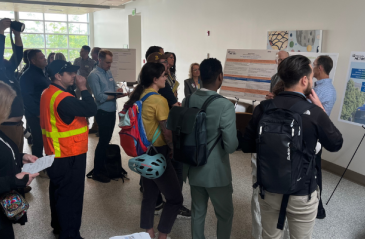
The information barriers holding back climate action and how to break them

Making govt services online easier to use may seem trivial, but can be deeply meaningful
Share articleCommunity expectations are shaped by their interactions with online services
Share articleThere is no excuse to ignore data and the potential of techniques like artificial intelligence
Share articleWe put our vision for government into practice through learning partner projects that align with our values and help reimagine government so that it works for everyone.
Governments operate in a different sphere to the private sector. Despite much talk of the impact of digital technology on states a government can't be disrupted in quite the same way as the taxi industry can be, for example. Even if one country was to offer an absolutely superior tax collection experience, a person from another country wouldn't suddenly start to pay their taxes there… But community expectations are shaped by their interactions with online services and they see no reason why online government services can't be as intuitive to use.
Making government services online more pleasant to use may seem trivial, but can be deeply meaningful. The impact of doing so ranges from saving time - making it easy to renew your passport or driving licence online - to other, more profound changes, such as issuing a lasting power of attorney more easy and quick during a time of profound grief.
The good news is, and we have the data to prove it, that globally governments have been advancing on this front. Two years ago, a survey was conducted among 12 industrialised countries asking communities about their experiences with digital government services. People have high expectations, but happily, 80% of respondents believe that their government's digital services have improved over the past two years.
While this is something to celebrate, it is also only part of the story. If we can iterate and improve websites and government services based on real-time data, then why can we not do the same with many of our policies? This won't work for everything - many issues, such as education, are long-term and we won't see the effect of government policies until years down the line. But for others, such as unemployment counselling, it can be done.
When we speak of evidence-based policymaking, we usually refer to taking the best available evidence of what has worked elsewhere to see how we should set up our own policies. This is fine - and there is really no excuse not to do this - but the problem is that results don't always travel . Just because something worked in one place doesn't automatically mean it will have similar effects in a different country or province. Context, nuance and local needs and history all have a huge part to play.
With this in mind, pioneering public sector organisations have started to test and experiment as they implement. Take the UK's Behavioural Insights Team, for example. They started to run randomized control trials with certain policy interventions to figure out what actually works and what doesn't. The canonical example is their work on a letter from the tax office that reminded you that you're late with your taxes. They found out that if you kindly remind people of the truth, which is that 86% of people in their community pay their taxes on time, it radically improves repayment rates.
This might seem like a small thing but it's a big deal because this improvement is essentially for free. Changing the words in the letter doesn't cost anything because these letters are sent out anyway. So why not improve them? Such experimental and empirical approaches also display a certain humility. Often we don't actually know what works and a great way to find out is to try things out and observe the result.
Humans do a fine job at setting up such experiments, but why not let an algorithm improve such letters? The issue with humans is that we're rather slow and with many transactional services that involve frequent touch points with communities, there is no reason why we couldn't let an appropriately bounded algorithm optimise the interaction.
There is huge potential here and the good news to any risk-averse policymaker out there is that it is already being deployed in the medical field. Doctors are already being outperformed by algorithms when it comes to diagnosing cancer, for example. Under those circumstances I'd rather be diagnosed by a machine than by a doctor because the chances of a machine getting it right far exceed that of a doctor.
This is already tentatively happening in social policy too. In New Zealand, the Ministry of Social Development, along with the Centre for Social Data Analytics at AUT University, Auckland, started a trial where they used 330 social economic indicators pulled from administrative data to identify children who are at an elevated risk of abuse ahead of time. It's an interesting application of data analysis, but of course also profoundly problematic one. It raised questions like what we should do with false positives, where we make interventions and then subsequently find out that they weren't actually needed. Or false negatives, when a child should have been identified as at risk but wasn't.
Ignoring this type of work is not an option, as these methods are here to stay. It's also worth pointing out that what New Zealand did was a basic level of data analysis - this wasn't fancy, cutting edge “artificial intelligence”, but basic statistical analysis. The scope to do more, faster, is huge.
Mistakes of course also occur with human case workers, but as a society we have not yet figured out how to adapt our governance and accountability structures to these new methods. It can be done, however. We need to find a consensus about what we consider acceptable, and what we don't. And if we're serious about improving government services, there is no excuse to ignore data and the potential of techniques like artificial intelligence. It's time to get on board.
Transforming technology, transforming government. Rare is the policymaker who doesn't see digital as a doorway for strengthening public services. But as Miguel Carrasco explains, the pace of the digital evolution means there is always more to do
Power to the people. Few countries have embraced the digital era as successfully as New Zealand. We talk to one of its government's key digital transformation leaders, Richard Foy,about how they've done it.
Computer says yes. Governments are increasingly reliant on digital technology to deliver public services - and Australia's myGov service is a potential game-changer, says Gary Sterrenberg
Digital dawn. It may not be obvious, but US policymakers have had an important role to play in the creation of today's digital era. But sometimes it involves stepping back rather than stepping up, suggests David Dean











